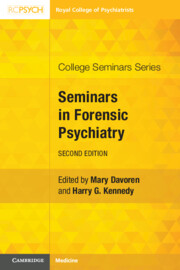Book contents
- Seminars in Forensic Psychiatry
- College Seminars Series
- Seminars in Forensic Psychiatry
- Copyright page
- Contents
- Contributors
- Foreword
- Introduction
- Chapter 1 Violence and Mental Disorder
- Chapter 2 Violence and Mental Disorder
- Chapter 3 Outcomes from the Key Inquiries and the Evolution of Modern Forensic Psychiatry
- Chapter 4 Prison Psychiatry
- Chapter 5 Legal Issues and Expertise in Forensic Psychiatry
- Chapter 6 Expertise, Structured Professional Judgement and Risk Assessment
- Chapter 7 Models of Care in Forensic Psychiatry
- Chapter 8 Psychopharmacology of Chronic Aggression and Violence in Forensic Settings
- Chapter 9 Ward Milieu and the Management of In-Patient Violence
- Chapter 10 Community Forensic Psychiatry Including Liaison with Health, Criminal Justice and Public Protection Agencies
- Chapter 11 Assessment of Personality Disorder, Psychopathy and Associated Offending Behaviour
- Chapter 12 Stalking and Threats to Harm and Kill
- Chapter 13 Sexual Offending
- Chapter 14 Terrorism-Related Assessments
- Chapter 15 Forensic Psychotherapy and Psychological Therapies in Forensic Mental Health Settings
- Chapter 16 Forensic Aspects of Medical Negligence
- Chapter 17 Child and Adolescent Forensic Mental Health Services
- Chapter 18 Women’s Services in Forensic Psychiatry
- Chapter 19 Forensic Psychiatry and Intellectual Disability
- Chapter 20 Cultural Service Delivery in Forensic Mental Health Services
- Chapter 21 Tackling Ethnic Inequality in Forensic Mental Healthcare
- Chapter 22 Academic Forensic Psychiatry
- Chapter 23 The No-Nonsense Guides
- Index
- References
Chapter 5 - Legal Issues and Expertise in Forensic Psychiatry
Published online by Cambridge University Press: 06 June 2024
- Seminars in Forensic Psychiatry
- College Seminars Series
- Seminars in Forensic Psychiatry
- Copyright page
- Contents
- Contributors
- Foreword
- Introduction
- Chapter 1 Violence and Mental Disorder
- Chapter 2 Violence and Mental Disorder
- Chapter 3 Outcomes from the Key Inquiries and the Evolution of Modern Forensic Psychiatry
- Chapter 4 Prison Psychiatry
- Chapter 5 Legal Issues and Expertise in Forensic Psychiatry
- Chapter 6 Expertise, Structured Professional Judgement and Risk Assessment
- Chapter 7 Models of Care in Forensic Psychiatry
- Chapter 8 Psychopharmacology of Chronic Aggression and Violence in Forensic Settings
- Chapter 9 Ward Milieu and the Management of In-Patient Violence
- Chapter 10 Community Forensic Psychiatry Including Liaison with Health, Criminal Justice and Public Protection Agencies
- Chapter 11 Assessment of Personality Disorder, Psychopathy and Associated Offending Behaviour
- Chapter 12 Stalking and Threats to Harm and Kill
- Chapter 13 Sexual Offending
- Chapter 14 Terrorism-Related Assessments
- Chapter 15 Forensic Psychotherapy and Psychological Therapies in Forensic Mental Health Settings
- Chapter 16 Forensic Aspects of Medical Negligence
- Chapter 17 Child and Adolescent Forensic Mental Health Services
- Chapter 18 Women’s Services in Forensic Psychiatry
- Chapter 19 Forensic Psychiatry and Intellectual Disability
- Chapter 20 Cultural Service Delivery in Forensic Mental Health Services
- Chapter 21 Tackling Ethnic Inequality in Forensic Mental Healthcare
- Chapter 22 Academic Forensic Psychiatry
- Chapter 23 The No-Nonsense Guides
- Index
- References
Summary
Psychiatrists, alongside other medical experts, have a role in applying clinical and scientific expertise in legal contexts. The courts use expert evidence when dealing with matters outside the knowledge of the layperson, in particular the judge and jury. Forensic psychiatry training has a particular focus on the care and treatment of offenders with mental disorder. Forensic psychiatry practitioners are expected to have not only specialised knowledge of mental disorder but also detailed knowledge of the relevant legal issues and justice systems. It is crucial that psychiatrists acting as expert witnesses understand the nature of the legal issues in order to function competently at court. This chapter outlines the role of the psychiatrist as an expert witness and summarises legal issues on which forensic psychiatrists are asked to comment in criminal settings, namely fitness to plead, mental health defences and sentencing.
- Type
- Chapter
- Information
- Seminars in Forensic Psychiatry , pp. 119 - 140Publisher: Cambridge University PressPrint publication year: 2024

